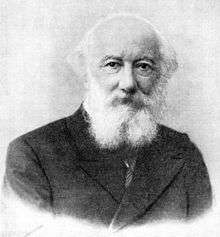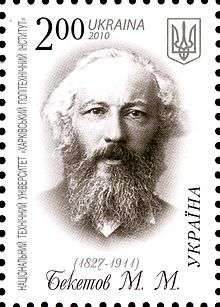Nikolay Beketov
Nikolay Nikolayevich Beketov (Russian: Николай Николаевич Бекетов; Alferevka (now Novaya Beketovka, Penza Oblast) January 13 [O.S. January 1] 1827 – St. Petersburg, December 13 [O.S. November 30] 1911) was a Russian physical chemist and metallurgist.[1]


Life and work
In 1849, Beketov graduated from Kazan University and worked with Nikolay Zinin. In 1855, he became a junior scientific assistant in the Department of Chemistry at Kharkov University. In 1859–1887, Beketov was a professor at the same university. In 1865, he defended his PhD thesis on "Research into the phenomenon of displacement of one element by another" ("Russian: Исследования над явлениями вытеснения одних металлов другими"). In 1886, Beketov moved to Saint Petersburg, where he worked at the academic chemical laboratory and taught at the University for Women. In 1890, Beketov delivered lectures on the "Basics of Thermochemistry" at Moscow State University.[1]
Beketov discovered displacement of metals from solutions of their salts by hydrogen under pressure. He also established that magnesium and zinc displaced other metals from their salts under high temperatures. In 1859–1865, Beketov proved that aluminum restored metals from their oxides under high temperatures. Later on, Beketov's experiments served as a starting point for aluminothermy.[2]
Beketov's biggest merit was his contribution into physical chemistry as an independent science. In 1860, he taught a course on "Relations between physical and chemical phenomena" in Kharkov and a course on "Physical Chemistry" in 1865. In 1864, a Physical Chemistry Department in Kharkov University was established with his active participation, where students would conduct research and do practical work.[1]
In 1886, Beketov was elected a full member of the Petersburg Academy of Sciences.[1]
Beketov's students were Alexander Eltekov, Flavian Flavitsky and others. The poet Alexander Blok was his brother's grandson.
References
| Wikimedia Commons has media related to Nikolay Beketov. |
- Andrusev, M. M. (1977). "150 Years since the birth of the eminent Russian physical chemist and metallurgist N. N. Beketov". Metallurgist. 21 (6): 416–418. doi:10.1007/BF01132763.
- Morachevskii, A.G. (2005). "70th Anniversary of the Foundation of Russia's Aluminum Industry". Russian Journal of Applied Chemistry. 75 (5): 856–860. doi:10.1023/A:1020399621412.